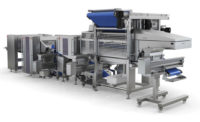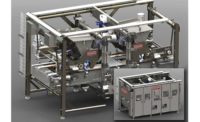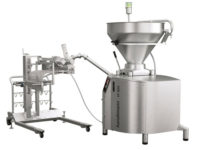Dividers, depositors, rounders need versatility, precision, capacity
Snack and bakery customers search for machines that can do it all

Snack and bakery customers in the market for dough-handling equipment like dividers, depositors, and rounders are looking for versatility, greater precision, higher capacity, longer maintenance intervals, adjustability of qualities like width and weight, and machines that can handle natural, clean-label, and gluten-free products.
Pulse of the market
Customers of Rheon USA, Irvine, CA, have been asking for adjustable-width dividers to reduce scrap or trim and be more economical, says John Giacoio, vice president, sales. “They don’t want to waste product,” he says. “They want better quality. We also needed a machine that’s easier to clean. We needed it more user-friendly. We needed a design that’s more efficient.”
At Gemini Bakery, Philadelphia, the need for dividers with greater weight-range variability has been on customers’ minds, says Jerry Murphy, vice president, sales. “If a particular customer has a wide weight range that they’re trying to produce on the same line, historically you have to have made some kind of compromise,” he says. Greater variability gives bakeries more flexibility regarding the weight range.
Handtmann, Inc., Lake Forest, IL, hears regularly from customers about the need for greater precision to reduce waste and shorten return on investment, longer maintenance intervals and lifecycle reliability to reduce service costs and maintain capital investment value, and operational flexibility with consistently high-quality results despite changing products and market conditions, says Patrick McGady, national sales and marketing manager. “In addition, we are seeing that the demand for efficiency is now beginning to include more discussions of 4.0 performance-monitoring and equipment communication with business systems for management purposes.”
Customers of Reiser, Canton, MA, are looking for versatility, according to John McIsaac, vice president of strategic business development. “They do not want single-purpose machines. They want to be able to change their product mix as their customers’ tastes shift.” Customers are also demanding equipment with a high level of hygiene, he notes. “We produce machines that are easy to take apart and clean for the highest levels of food safety and sanitation.”
Koenig Bakery Systems, Ashland, VA, has been seeing demand for lines with both high capacity and multifunctionality, says Richard Breeswine, president and CEO. “Thus, customers can save investment costs with only one high-performance line featuring many different buns and rolls. In the field of dough dividing and rounding in industrial production, there are basically two principles: On the one hand, there are lines for high quality and modularity, however with limited capacities. On the other hand, there are monolines with extruders.” But customers want a heterogenous capability to do both, he adds.
Natural products, cleaner labels, inclusions, and gluten-free options are top-of-mind for Unifiller, Delta, British Columbia, according to Andy Sigrist, company consultant. “Depositors have to be able to handle a wider range of products, and more inclusions in general. We’re offering a wider range of attachments than ever before.”
Processing innovations
Hinds Bock, Bothell, WA, manufactures flexible depositors that can span customers’ larger products and mini-products, says Rod Gregg, executive vice president. These systems are able to change over very quickly from product to product, saving production time on each shift and producing a wide range of bakery products each day, he says.
“All Hinds-Bock depositors have very large product flow paths, which allow large particulates, such as berries and nuts, to pass through with very minimal damage,” Gregg says. “Having individual pistons and cylinders on the machines provides excellent weight control with all viscosities of batter. The quickly removable piston and cylinder sleeves make it very quick to change over.”
AMF Bakery Systems, Richmond, VA, has been very successful in the last year with the AMF D3, which provides direct dividing and depositing of gluten-free bread and roll dough, as well as pizza dough, says Bruce Campbell, make-up product group leader. “Gentle, low-pressure metering of the dough is the key to the D3. Customers report drastic improvement in grain structure, product quality, and reliability. Dough-piece handling into the pan with high placement accuracy is achieved through a unique cut-off knife and pan conveyor adjustment system that ensures target accuracy for a wide range of sizes and shapes of bread and rolls.”
Koenig has introduced the brand-new T-REX AW, which provides greater efficiency in dividing and rounding with an output of 72,000 pieces per hour across 12 rows, producing hamburger and hot dog buns, doughnuts, and cut rolls. With a weight range of 0.8 to 2.4 ounces, the T-REX AW can produce a variety of products, ranging from longer-resting doughs to higher dough yields and those with inclusions like raisins or nuts, Breeswine says.
“The high performance is achieved with specially designed rounding ledges,” says Breeswine. “The spreading finger belts are extractable for cleaning and maintenance. The dough pieces are then transferred to a rounding belt and rounded with the special rounding ledges.” Ultimately, the machine reaches 100 strokes per minute output, with gently and smoothly rounded dough pieces, he says.
Rheon USA offers the V4 Twin Divider, which has been upgraded to offer flexible width so the dough sheet can be adjusted at the very beginning of the line, Giacoio says. “That allows us to reduce trim or scrap. It can also be very economical. It cuts at a predetermined weight.” With production capacity of 1,000 kilograms per hour, it provides user-friendly operation and a safe, hygienic design.
Rheon also offers a 2-Lane Punch Rounder that’s geared toward artisan breads and larger loaves, Giacoio says. “It mimics what you would do by hand to round a piece of dough. It allows you to under-round, over-round, whatever you want. It’s very adjustable.”
Gemini has rolled out a new generation of the Tewimat TWS divider, which runs softer doughs and a wider weight range with adjustable transmission, Murphy says. “We can make an adjustment to where the transmission clears, to allow larger dough balls to pass. We can close up that gap between the transmission and the rounding drum, when we are running the smaller dough balls.”
The TWS also provides a reduced-flour option, the TWS RF-TPA, to reroute the rounder belt to reduce the amount of flour needed, Murphy adds. “There’s an ingredient cost savings in running the divider in the reducer-flour version.”
The VF 800 divider from Handtmann offers an adjustable vane cell design that creates less product-to-surface contract, resulting in less degradation of the product due to friction, McGady says. The divider can be adjusted to maintain OEM precision over time without expensive replacement components, and it provides extremely accurate weight parameters, he says.
Other key features of the VF 800 include a “laser focus on sanitation,” with all components in contact with food designed to make cleaning effortless, an elimination of traps, flexibility to address dramatic changes in volume requirements with software licenses rather than new machines, optimized accuracy within 1 percent, and optional 4.0 software applications to automate additional processes like error message monitoring, operation status tracking, and downtime tracking, McGady says.
Reiser has unveiled a high-speed servo cutter for smaller pizza doughs and bread-dividing applications, as well as the Vemag dividing line in partnership with Gemini, McIsaac says. “We have made advances in the Vemag double-screw pumping system to more-gently handle yeast-raised doughs while maintaining our best-in-class scaling.” Recently, Reiser installed its power-assist flow divider to increase the range of high-quality rolls that can be produced with Vemag, with a capability of 150 cuts per minute across four, six, or eight lanes.
The main improvements for Reiser and Vemag have been speed and quality, McIsaac says. “We have made faster cutters to take advantage of our new Vemag double-screws. Reiser has added talented bakers to our staff to bring these innovations to the field and help the customers streamline their production.”
Sigrist notes that Unifiller’s pneumatic depositors have received upgrades in sanitary design, both in terms of materials used and the overall design. “Anything exposed is stainless steel. There’s very little, if any, aluminum left.”
Unifiller also makes servo depositors, which provides electronically controlled settings and more-accurate depositing, Sigrist says. “People want servo. It’s simpler and easier to operate. Younger people want to go through a screen and call up the recipe. They don’t want to fiddle around with knobs and look at scales.”
Looking for a reprint of this article?
From high-res PDFs to custom plaques, order your copy today!






